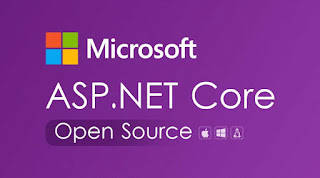ASP.NET Core Introduction
ASP .NET
Core is an open-source, free, general-purpose development platform that maintained
by Microsoft and also the GitHub .NET community. ASP .NET code framework is rewrite from
scratch in sequence to build cross-platform, open source and modular
programming.
It’s
initially launched with the name of ASP .NET 5 but after its changed with ASP
.NET Core.
ASP .NET
core basically supporting Windows OS, Mac OS, and Linux OS and will be
generally accustomed build device, cloud and IoT applications.
It’s an open
source framework that supported by Microsoft and the GitHub community, so you
will also download/contribute the application source code from the specific
repositories on Github community.
ASP.NET Core Versions History
Characteristics of .NET Core
1. Open source
- .NET Core allows open source implementation,
using Apache 2 and MIT licenses.
- .NET Core is a .NET Foundation project and it is available on GitHub community.
- As .NET Core is an open source project, it allows and promoting transparent development processing, active and engaged community.
2. Cross-platform
ASP.NET Core
applications can run on Windows OS, Linux OS, and Mac OS. So you do not
required to build individual applications for various type of platforms using
different kind of frameworks.
3. Flexible deployment
There are two styles
of deployments that .NET Core applications allows:
- Framework-dependent deployment
- Self-contained deployment
With use of
framework-dependent deployment, your applications depend upon a system-wide
version of .NET Core on which your application and third-party dependencies are
installed.
With use of
self-contained deployment, the .NET Core version helping to build your
application is it additionally deployed together with your application and
third-party dependencies and many more to run side-by-side with other versions.
4. Command-line tools
All
product scenarios is exercised at the command-line.
5. Compatible
.NET Core
compatible with Microsoft .NET Framework, Mono and Xamarin, via the .NET
Standard Library.
6. Modular
- .NET Core technology is released through NuGet in small-scale assembly packages.
- .NET Framework is one large assembly which contains most of the all core functionalities.
- .NET Core is created available as smaller feature-centric packages.
- This modular approach enables the developers to optimize their application by including just those NuGet packages which they have in their applications.
- The smaller application benefits is extent include tighter security, improved performance, reduced servicing, and also decreased costs during a paying for your using model.
Components of .NET Core
The below
figure demonstrate the .NET Core components.
As
demonstrate in above figure, .NET Core technology involve .NET Compiler
platform Roslyn, .NET Core framework CoreFX,
.NET Core runtime CoreCLR and ASP.NET Core.
ASP.NET Core is fragment of .NET Core SDK, so you don't required to install
ASP.NET Core separately. ASP.NET Core and .NET Core is a fragment of .NET Foundation.
.NET Core
technology comes under MIT or Apache 2 licenses. Visit .NET Core repository on Github to contribute or download the application source
code.
Why ASP.NET Core?
1. Supports Multiple Platforms
ASP.NET Core
applications can run on Windows OS, Linux OS, and Mac OS. So you do not
required to build various applications for various platforms using wide range
of frameworks.
2. Fast
ASP.NET Core
is no more depends on System.Web.dll for browser-server communication. ASP.NET
Core allows us to incorporate packages which we want for our application. Its
reduces the requesting pipeline and improving the performance and scalability
of application.
3. IoC Container
It's include
built in IoC container to automatic dependency injection that make it
maintainable and testable.
4. Integration with Modern UI Frameworks
It's allow
you to use and manage modern UI frameworks like ReactJS, AngularJS, Bootstrap,
Umber etc. using Bower (a package manager for the web applications).
5. Hosting
ASP.NET Core
web application is hosted on multiple platforms like IIS web server, Apache web
server etc. It's not dependent only on IIS as a typical .NET Framework.
6. Code Sharing
It allows
you to create/build a class library which is used with other .NET frameworks
like .NET Framework 4.x or Mono. Thus a one code based is shared across
frameworks.
7. Side-by-Side App Versioning
ASP.NET Core
technology runs on .NET Core which supports concurrent running of multiple
versions of applications.
8. Smaller Deployment Footprint
ASP.NET Core
application running on .NET Core technology that is smaller than full .NET
Framework. So applications that using only a fragment of .NET CoreFX can have
smaller deployment size. This reduces the deployment foot print.
What is the difference between ASP .NET Core and .NET Core?
- Peoples are untidy between ASP.NET Core and .NET Core. Please note that ASP.NET Core and .NET Core don't seem to be the identical. It's different, a bit like ASP.NET and .NET Framework are different.
- .NET Core is a faster, lightweight, modular and open source framework for creating web applications and services that run on Windows, Linux and Mac. So, it's a platform on that ASP.NET Core applications runs.
- .NET Core is called "Core" because it includes core features of the .NET framework. The objective of .NET Core is to build .NET framework open source, and cross-platform compatible so that it utilized in resource-constrained environments. It includes minimum features that are required to run a basic .NET Core applications and other advanced features that will be included as a package from NuGet.




No comments:
Post a Comment